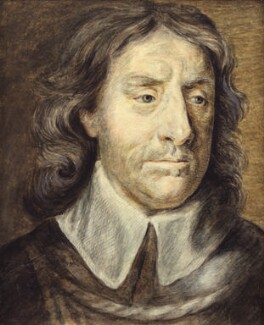Cromwell, Oliver (1599—1658), Lord Protector of England, b Huntingdon, descendant of a nephew of Thomas. He was educ. at Huntingdon Grammar School and Sidney Sussex College, Cambridge, and later studied law at Lincoln’s Inn.
He married Elizabeth Bourchier, daughter of a London merchant. and settled in his native co. He sat for Huntingdon in the Parliarnent of 1628, and for Cambridge in the Short and Long Parliaments, 1639 and 1640. Cromwell, was by this time beginning to gain a parl reputation.
He was never a fluent speaker, but his ponderous earnestness and obvious sincerity gained him an eager audience among the parl extremists. But while Pym (q.v.) and Hampden (q. v.) lived, and while the struggle was merely a battle of words and parl tactics.
Cromwell,remained relatively in the background, a loyal supporter of parl. supremacy, but not a leader; it was the Civil war (q.v.) itself which was to bring him into real prominence and give him eventually the supreme power in the country.
When war broke out C. contributed generously to parl funds, helped to form the E. Association, which secured E. Anglia for the parl party, and joined the army as a captain. Impressed by the superiority of the Royalist horse at Edgehill (1642), he conceived the plan of encountering his opponents’ enthusiasm with Puritan zeal and strict discipline. Raisinga troop of godley men’ in his own dist and training them himself, they proved so efficient that the whole parl. army was gradually remodelled on the same lines.
At Marston Moor C’s Ironsides turned defeat into victory, and at Naseby (1645) he won the decisive battle of the entire campaign. He was now recognised as the greatest soldier in England; his administrative abilities and tactical genius are still admired, and are all the more remarkable in a man who, before 1642, had had no military training or experience.
Cromwell, took part in the abortive negotiations between Charles I and Parliarnent, but gradually became convinced that the deposition and execution of Charles were not only politically expedient, but divinely predestined. Though in later years he was assailed by many doubts, his actions with regard to Charles I never seem to have troubled him conscientiously. He was one of Charles’s judges, and signed the king’s death-warrant.
The Irish campaign, with the massacres Of Drogheda and Waterford, waged under Cromwell command to crush Royalist resistance in Ireland, has left a permanent stain on C.s character. Though he has often been as unusually tolerant in an intolerant age, his savage and indiscriminate butchery of the Irish Royalist garrisons and of ordinary Irish Catholies can only be explained, though hardly justified, by Cromwell,’s conception of himself (which he clearly seems to have had, at least in moments of crisis) as a servant of the Lord sent to purify the people and root out papistry and episcopacy by any means necessary.
Returning to England, Cromwell put an end to the Scottish alliance with Charles II by his victories at Dunbar (1650) and Worcester (1651), which increased his military reputation still further. It seemed that the Stuarts were gone from England for ever.
But in 1653, impatient of the mismanagement and intrigue of the Rump Parliament, which was disregarding the demands of the army which had ensured its supreme position, and which now seemed on the verge of converting itself into a permanent oligarchy, Cromwell, on behalf of the army , forcibly dissolved the House and set up what was in practice a military despotism. Cromwell and the army officers made various attempts to broaden their gov. system.
Firstly, they tried the experimenter of calling a Parliament of selected members, the Little or Barebones Parliament (q.v.); but this proved quite unworkable in practice, and subsequently under a written constitution, ‘The Instrument oi Government’, C. was installed as lord protector of England, Scotland and Ireland.
Though the Instrument gave the protector vast executive powers, it did provide tor an elected parliament. C.’s first Parliament (1654—5) concentrated its efforts on trying to limit the protector’s powers, with the result that he dissolved it as soon as he could, and for the next 18 months the administration of the country was in the hands of the major-generals.
This was the period when the most concentrated attempts were made to introduce on a national scale the features for which C. is perhaps best remembered—a relative tolerance of religious observance (for Protestants of varying views, so long as they were not in favour of episcopacy) and the suppression of cock-fighting, horse-racing, Sunday sports, etc. It is also the period in which former Royalists suffered most severely materially.
The major suffered most severely material;.
Withe major- generals were generally unpopular; in 1656 C. suspended them, and summoned his second Parliament, which offered him the crown and revived a second chamber. It is fairly certain that C. would have accepted the crown but for the objections of the army; in fact, after the dissolution of this Parliament in Jan. 1658 he was king in all but name, and in practice it is clear that his government.
